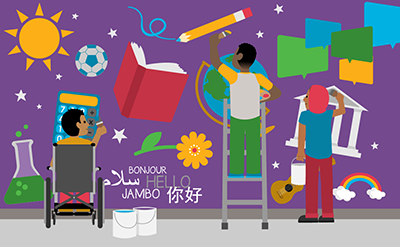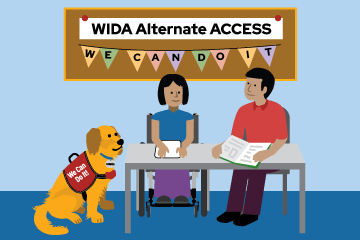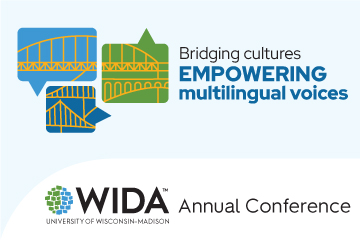WIDA’s commitment to social justice and addressing inequities in education

WIDA is celebrating its 20th anniversary this year! As a way to mark this occasion, we’ve asked staff members to write about the ways in which WIDA enacts its mission, vision and values. In the following article, Delis Cuéllar, Jason Kemp, Grazzia Maria Mendoza, Narek Sahakyan and Edynn Sato discuss social justice at WIDA.
Inequities and disparities related to quality education and access to resources are some of the most pressing current issues in education. And these inequities are especially salient in the lives of multilingual learners and their families. As part of its commitment to social justice, WIDA monitors as many issues as possible, from the broadest to the smallest. This includes everything from recognizing and responding to concerns in the national education landscape, to working to understand our own personal interpretations of social justice.
The Current National Climate
The pandemic has increased awareness of the inequalities present in our societies, both locally and globally, and action is needed. At WIDA, we recognize that addressing issues related to equity and social justice and holding complex conversations among stakeholders lead toward accountability and sustainable solutions that support all learners.
Beginning in 2021, the federal government has used executive orders and provided funding through the American Rescue Plan to support schools in safely reopening and to address the pandemic's unequal impact on some student subgroups, including students identified as English learners (ELs).
Consistent with these actions, schools are supporting ELs in a variety of ways, such as purchasing teaching materials and student resources that take into consideration EL student needs; hiring multilingual staff with theoretical and practical knowledge of the language needs of ELs; offering professional learning opportunities that focus on evidence-based instructional strategies for ELs; initiating summer and after-school learning and enrichment opportunities; formalizing and strengthening partnerships with community-based organizations that partnered with multilingual families during the pandemic.
Such efforts are critical, because the pandemic has had a profound impact on the K-12 education system. Multilingual learners (MLs) especially have faced substantial and ongoing challenges due to systemic factors that place them at an increasing disadvantage. Disruptions in school-based language supports, such as modified course content and ESL teacher shortages have likely exacerbated existing inequalities.
A Social Justice Informed Response
To start unpacking and understanding the complex ways in which the pandemic has impacted the academic trajectories of these students, researchers at WIDA have examined test scores from the entire population of students taking WIDA’s ACCESS for ELLs English language proficiency assessment, before and after the pandemic. First and foremost, we found a large and persistent impact of the pandemic on students’ proficiency, which has gradually declined in the years following the pandemic.
Furthermore, we uncovered substantial disparities in average English proficiency outcomes across several subgroups of EL students, which have been exacerbated by the pandemic. For example, Hispanic students - making up about 70% of the English learner population nationally and across WIDA - were already behind non-Hispanic ELs by about a half semester of instruction; now they are behind by almost a full academic year!
This ongoing research informs the resources WIDA provides educators, and it reflects our core values and commitment to supporting multilingual learners and those who serve and advocate for them.
Smaller Scale Activities
Locally at WIDA, we try to lean into social justice by keeping the perspectives and experiences of multilingual learners and their educators at the center of all that we do. During our most recent all-staff retreat, multilingual youth and educators participated in a panel discussion. The students shared their multilingual pride with us and described educational challenges. The educators described some ways in which they support their multilingual learners through relationship building.
Anu Ebbe, an associate superintendent with the Madison Metropolitan School District, gave the keynote address in which she talked about her work as an educator and advocate for students, her experiences as a multilingual learner, and her hopes for the future of education for multilingual learners.
WIDA staff also organize virtual Lunch and Learn sessions with students and educators. During these sessions, the primary goal has been to listen, learn, and reflect on how we can better support students and their educators. In addition to these events, every summer, a high school student local to Madison, Wisconsin, joins WIDA as an intern. These multilingual students have contributed to WIDA marketing and research projects.
Social Justice Informed Outcomes
Finally, WIDA incorporates our social justice value into our assessments and professional learning opportunities. One way we accomplish this is through a cycle of feedback from educators and members of our students’ communities. Many WIDA staff members are former educators, but we know that we must rely on the expertise of the classroom teachers, language development specialists, school-/district-/state-level leaders, parents/caregivers, etc. to guide our work. Every year, numerous educators and members of our diverse learners’ communities from across our 41 member states, territories and federal agencies participate in surveys, focus groups, and assessment bias, sensitivity and content reviews. We are at a transformative time in education, and WIDA will continue to take an active role in challenging linguistic discrimination, cultural biases and racism in education, by serving as a foundation for a community that uplifts and includes the voices of educators of multilingual learners.
About the Authors
Delis Cuéllar is a researcher on the Assessment team. She conducts research on behalf of multilingual students with significant cognitive disabilities with parents, educators, and PreK to grade 12 students.
Jason A. Kemp is a researcher on the Assessment team. He participates in research projects that support multilingual learners and their educators. His duties also include evaluating test items and graphics during annual bias and sensitivity reviews of new content.
Grazzia Maria Mendoza is a researcher for WIDA Español with 30 years' experience in education. She facilitates research processes and is responsible for coordinating research with educators and local school districts and conducting the design of a learning agenda to inform decision-making.
Narek Sahakyan is a researcher on WIDA’s Assessment team. Narek’s work examines issues in educational policy and assessment. Narek works with WIDA states on technical assistance projects examining English Learner students' proficiency and growth, to inform school accountability models and federal, state and district-level policies on EL identification, assessment, monitoring and reclassification.
Edynn Sato is director of psychometrics and research on the Assessment team. She is responsible for overseeing psychometrics, research, and data systems related to WIDA’s operational assessments, as well as technical assistance provided to states that inform their assessment practices and policies and address their accountability needs.






